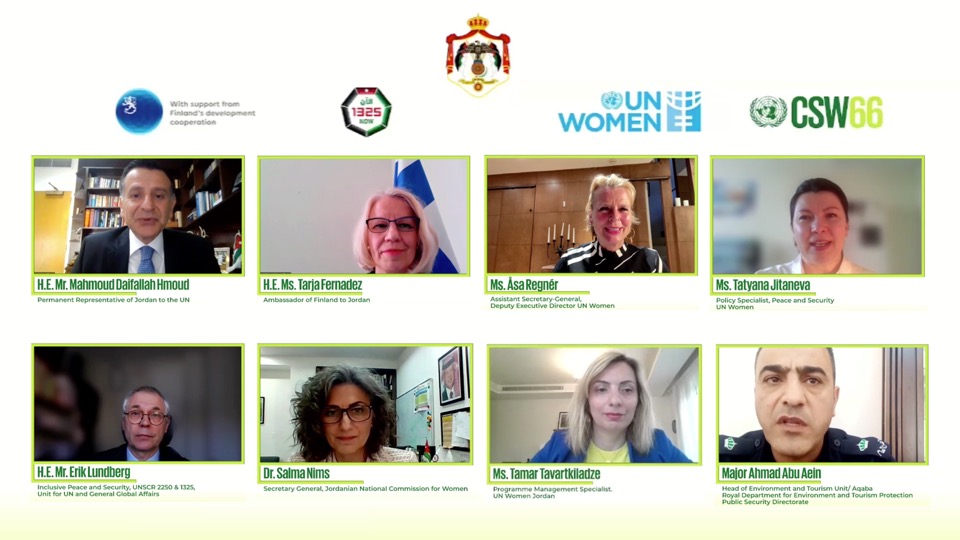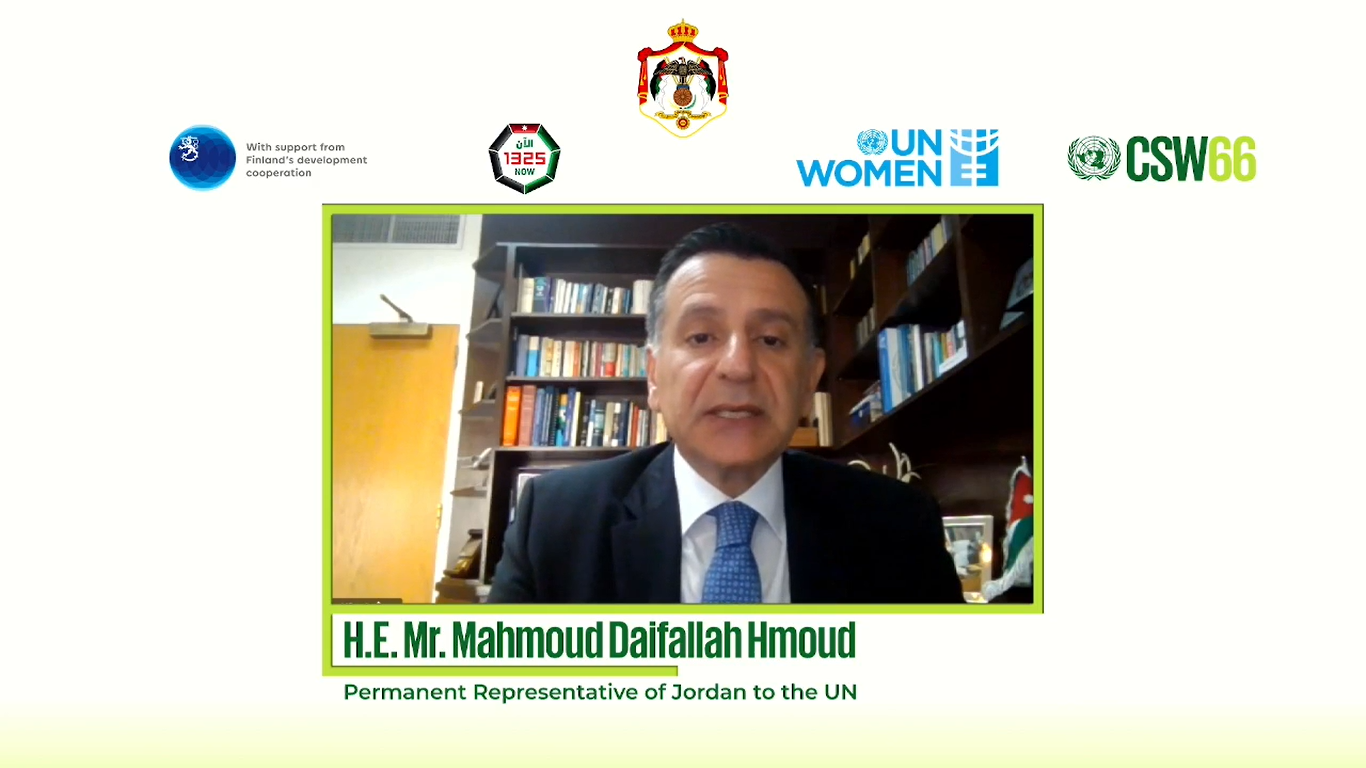UN Women marks CSW66 with a global side event on Gender, Climate, and Security
Date:

UN Women, in partnership with the governments of Jordan and Finland, recently tackled the essential topic of gender, climate, and security in a global side event marking the Sixty-Sixth Session of the Commission on the Status of Women (CSW66). The event was conceived with the objective of recognising the linkages between the climate emergency and protection issues related to gender, in addition to serving as an open platform for sharing knowledge and good practices in this regard.

H.E. Mr. Mahmoud Daifallah Hmoud, Permanent Representative of Jordan to the UN said “Climate change may be a cause of conflict or a consequence of it, which requires the international community to treat climate change not only as a socioeconomic challenge but also as a threat to peace and security. “He also added: “Women and girls should be a core component in policy of prevention and response to climate change associated with conflict.”
The virtual event brought together representatives of governments, UN Agencies, NGOs and CSOs working on environment and gender, research centres and academia, members of the diplomatic community and donor organisations, among others. The discussions proved vital for placing the issue of climate change in perspective and viewing the challenges it presents through the lens of gender.
“When climate and security risks are analyzed and policies are drafted, it is very important to take into account the gender lenses and bring these three elements together,” said H.E. Ms. Tarja Fernandez, Permanent Representative of Jordan to the UN.
The impacts of climate change are both volatile and far-reaching, affecting communities in every corner of the globe. And yet, humanitarians agree that people experience these impacts differently, based on factors that are often beyond their control, including gender, socio-political factors, and economics.
"Gender transformative climate action can really be a powerful catalyst to strengthen peace-building efforts and an opportunity to advance gender justice,” said Ms. Asa Regner, UN Women Deputy Executive Director and UN Assistant Secretary General.
Dr. Salma Nims, Secretary General, Jordanian National Commission for Women, said, “We are looking at civil society and women groups to be actively participating in developing and coordinating the implementation of crisis and emergency response plans.”
Despite this, gender dynamics are still generally lacking in climate-security policymaking and practice to date. A recent example is the open debate held in the UN Security Council in January 2019, during which five out of 75 member states who took the floor recognized gender considerations as important in responding to climate-related security risks.
Mr. Erik Lundberg, Inclusive Peace and Security Ambassador, UNSCR 2250 & 1325, Unit for UN and General Global Affairs, stressed on the importance of the role that girls and women play when addressing climate change issues and said, “Impacts of climate change amplify existing gender inequalities. Therefore, it is important to recognize the critical role that girls and women play as powerful agents of change when addressing climate change issues in a sustainable way. Promotion of gender equality should be a part of all our climate actions."
The global side event served to highlight the fact that gender equality — as a lens for climate and environmental action — ensures women’s full and effective participation and equal opportunities for leadership at all levels of decision-making in political, economic, and public life. It also served to highlight the importance of the issue for regions like the Middle East and North Africa, recognized as one of the most water scarce regions of the world and highly vulnerable to climate change. As the region continues to grapple with existing and emerging humanitarian crises, it becomes even more essential to tackle one of its most serious impending challenges.
Ms. Tatyana Jitaneva, Policy Specialist, Peace and Security, UN Women, shed light on the participation of women in policy making and said, "Continued efforts will be needed to address the linkages between gender, climate and security, and the meaningful participation of women and marginalized groups in national policy-making and planning and legal reforms."
Moreover, participants unanimously agreed that the impacts of climate change compound economic, political, social, and environmental pressures, which will undoubtedly exacerbate many of the humanitarian needs manifesting throughout the region.
“Gender-mainstreaming in overcoming climate change must be built on a holistic, social, participatory responsibility from all community members, whether individuals or organizations,” said Major Ahmad Abu Aein, Head of Environmental and Tourism Security Unit- Royal Department for Environment and Tourism Protection/ Public Security Directorate.
The discussions centred on highlighting successful models from around the globe and explore strategies to help partners and local organisations incorporate gender-sensitive climate action into their planning process.
-Ends-
Available in Arabic here.